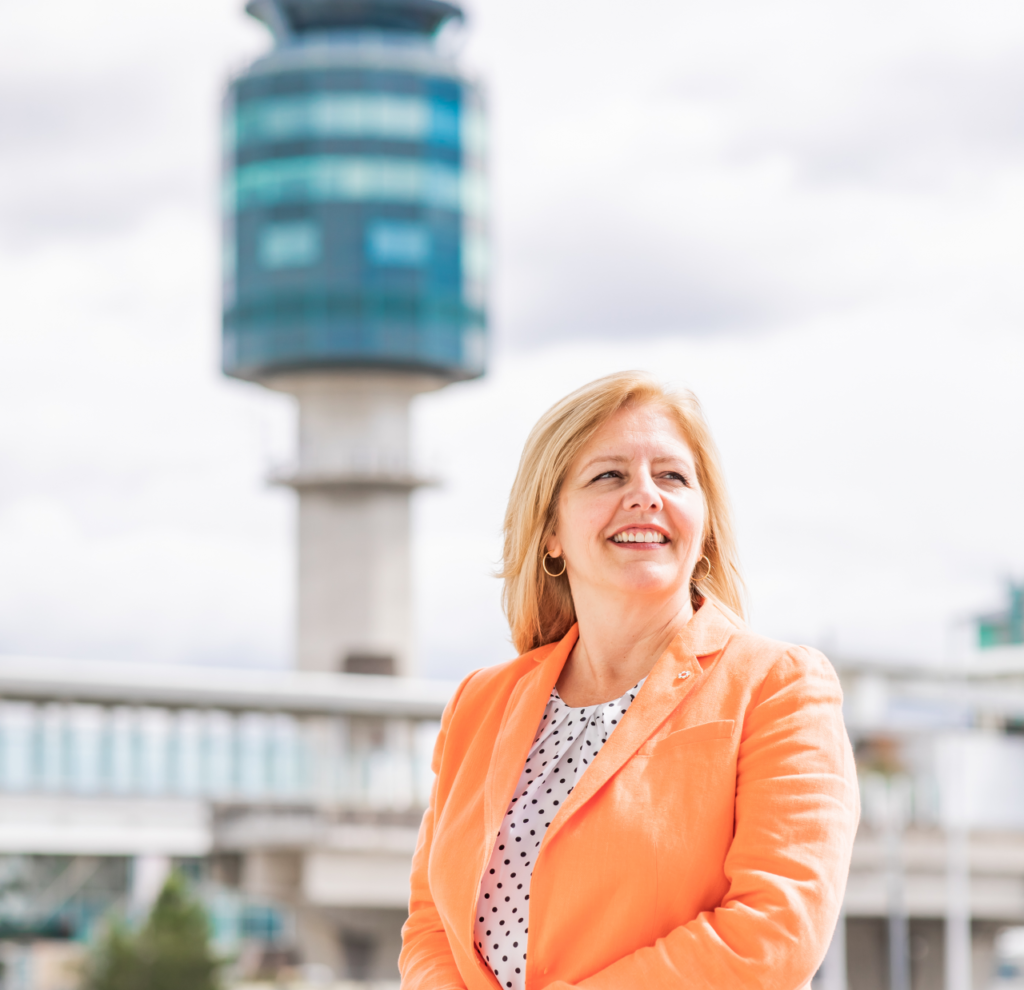Estimated reading time 5 minutes, 58 seconds.
Only 10 weeks after taking over as the Vancouver Airport Authority’s chief executive officer, Tamara Vrooman made the difficult decision in September to halt a major expansion program.
Vrooman didn’t fixate on the $525 million already spent on developing new infrastructure. Instead, she looked at depressed travel trends during the pandemic and opted to stop construction of facilities such as a central utilities building and a six-storey parkade. The hope is to eventually complete the capital program for an estimated $275 million in future.

“We don’t lose that investment that we’ve made. We’re able to just continue it. So think of it as we’re breaking it into two rather large phases,” she said in an interview with Skies in late October.
The authority manages Vancouver International Airport, also known by its code, YVR.
A separate project, the $300 million Pier D international terminal expansion, had been temporarily delayed amid health precautions against the spread of the novel coronavirus. But Pier D resumed construction in the summer since it would be nearing completion by the end of 2020.
YVR, like other airports around the world, has watched its passenger traffic plunge during the COVID-19 crisis.
In September, for example, YVR handled 355,414 passengers, down 85 per cent from the same month in 2019. For the full 12 months of 2020, Canada’s secondlargest airport is forecasting traffic of roughly seven million passengers, compared with a record high of almost 26.4 million travellers in 2019.
In May, YVR announced a 25 per cent reduction of its 550-person work force, underscoring the severity of the impact of COVID-19 on air travel.
Vrooman joined YVR on July 1, after nearly 13 years as CEO of Vancouver City Savings Credit Union (Vancity). She replaced the retiring Craig Richmond, who led YVR for seven years.
At Vancity, Vrooman took over the top job just as the financial crisis was unfolding in the fall of 2007. In 2020, she describes her new role as guiding YVR during a health crisis.
“It’s not very many times in your career that you get an opportunity, in this case for us, to take a couple of steps back and look at a whole business end to end,” she said.
“And that’s what we’re doing at YVR, and I don’t regret it for one moment. This is a fantastic organization — really important to our region and to our economy and our community.”
The University of British Columbia has partnered with YVR and WestJet on a voluntary trial project for COVID-19 rapid testing.
“Our first objective is about selecting a type of rapid test that is useful in an airport environment, scalable to recovering passenger traffic volumes and has strong potential for future Health Canada approval,” according to a joint statement by YVR’s Robyn McVicker and WestJet’s Billy Nolen.
They added that a COVID-19 testing pilot project with Canadians arriving from foreign locales at Calgary International Airport is geared toward reducing quarantine times to as little as two days. That Calgary project led by the Alberta and Canadian governments complements the trial at YVR, which calls for four hours of sampling daily to test for COVID-19 with departing WestJet passengers who are from the Vancouver region.
Looking ahead to 2021, Vrooman said travel demand will hinge on what types of travel restrictions and advisories are in place. “We’re starting to learn how to live and therefore travel safely with COVID-19,” she said.
“If the U.S. border were to open or there were testing protocols in place that would significantly reduce quarantine times, then we might see a domestic uptick, or domestic plus transborder uptick, or domestic, transborder and international. We’re using this opportunity to really take a look at all of our processes such that when passengers come back, we can do things better than we did before the pandemic.”
Ferio Pugliese, senior vice-president of Air Canada Express and government relations, said it’s important to discuss reopening the Canada-U.S. border in a safe fashion.
“There are a variety of things that can be done to stimulate a very safe, progressive, staged, and measured reopening of any border,” said Pugliese during a tourism forum webcast by the Greater Vancouver Board of Trade in November.
He said the long-term impact of COVID-19 could be felt for another three to five years, and government assistance will be among the measures required to boost the aviation and tourism sectors.
“Looking forward, we can all overcome this if we work closely together,” said Pugliese.
Vrooman emphasized that airports play a crucial role in regional economic development.
“I have a strong interest in working with our two main domestic carriers. . . . They are committed to our community and our region in a way that international carriers just simply can’t be, because they’re committed to their own jurisdictions,” she said, adding that it is also important to nurture relationships with foreign airlines.








